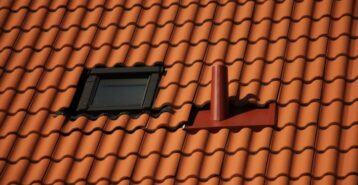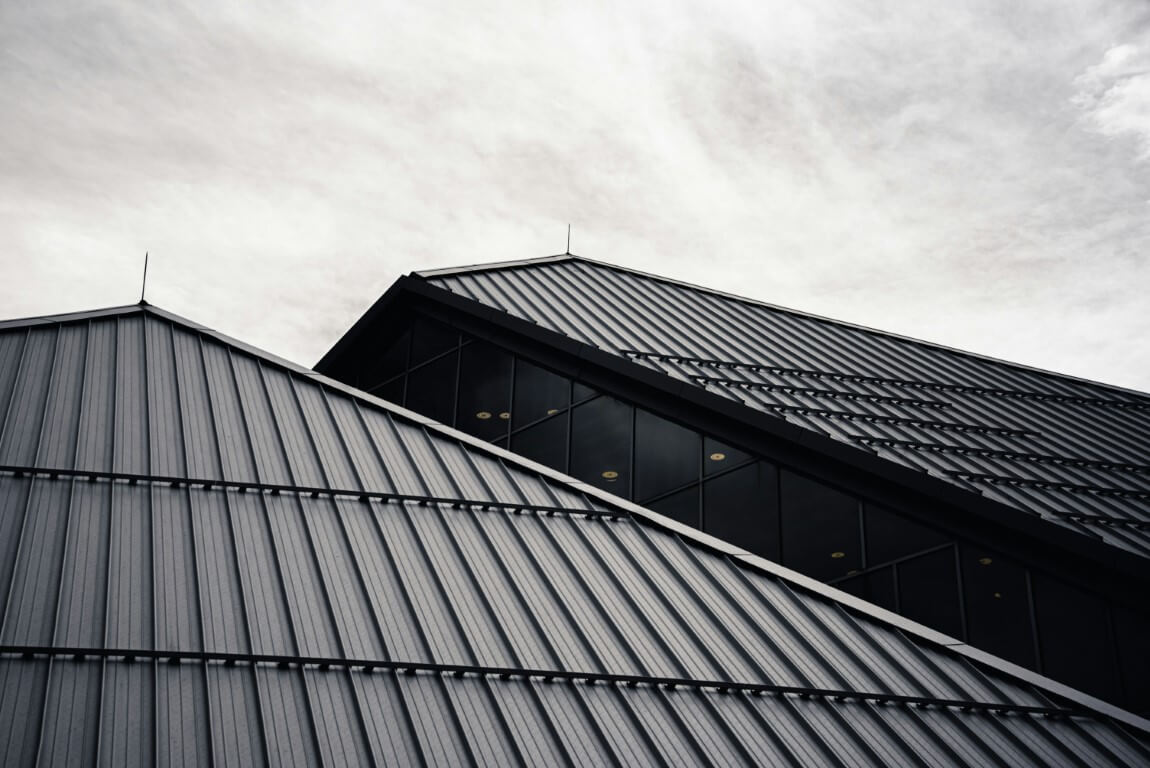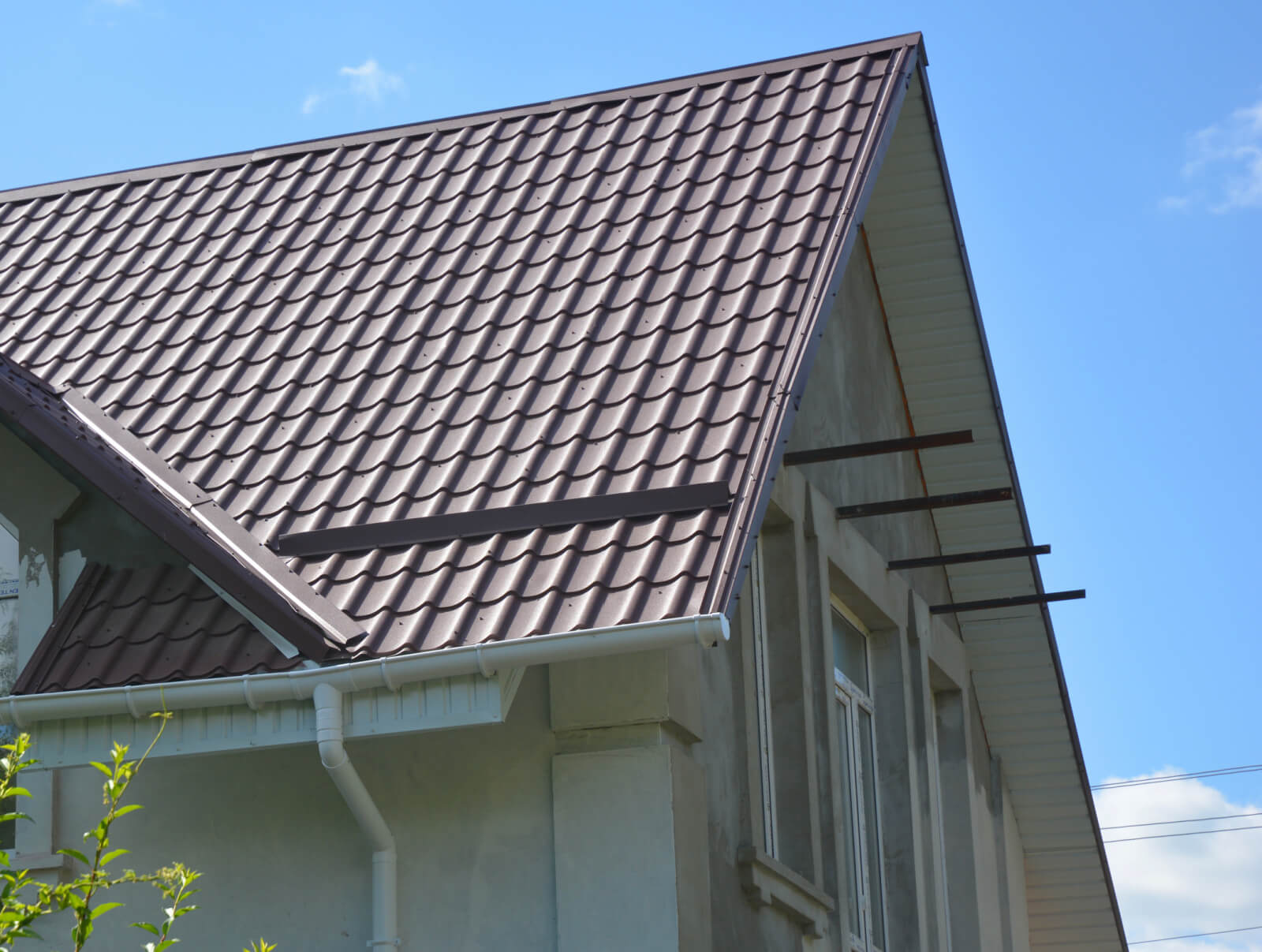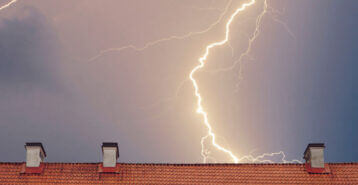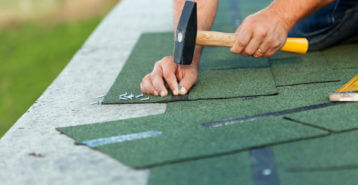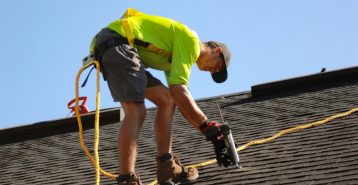What Is Spray Polyurethane Foam Roofing?
Spray polyurethane foam (SPF) roofing creates a seamless, insulating system by combining two liquid components, polyol resin and isocyanate. When contractors mix and spray these chemicals onto the roof surface, they react to form a lightweight, durable foam that expands and solidifies into a weather-resistant layer.
Key Terms to Know
- Self-Flashing: SPF conforms to roof shapes and objects like vents and pipes without needing additional materials, creating a watertight seal.
- Elastomeric Coating: A flexible, UV-resistant topcoat (typically silicone or acrylic) that protects the foam from sunlight and weather.
- SPF: Short for spray polyurethane foam, the material used in this roofing method.
- R-Value: A measure of thermal resistance. SPF offers an R-value around 6.5 per inch, making it highly energy efficient.
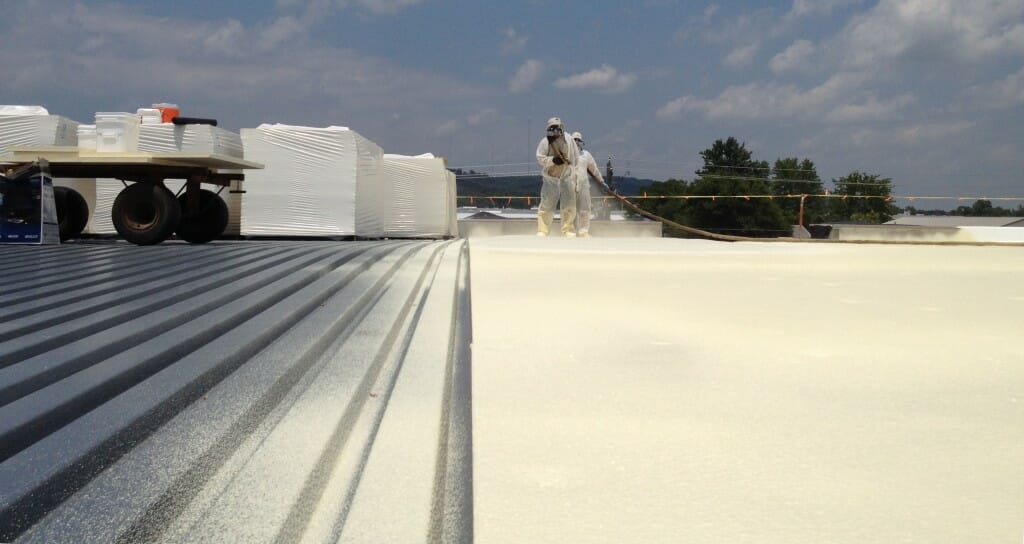
What Does a Spray Foam Roof Cost?
Spray foam roof installations typically cost:
- Residential: $4.00 to $7.00 per square foot
- Commercial: $6.00 to $12.00 per square foot
These estimates include both labor and materials. Final costs can vary based on roof size, condition, location, and the type of coating used.
How Is Spray Foam Roofing Installed?
Installing a spray foam roofing system involves several detailed steps. Each stage is essential to ensure the roof’s durability, performance, and energy efficiency. Here’s what to expect from start to finish:
Pressure Wash & Prime 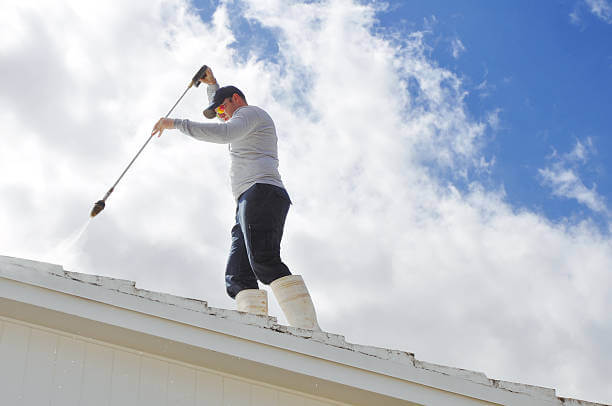
Before applying the foam, contractors begin by thoroughly cleaning the roof with a high-pressure washer. This step removes dirt, debris, oils, and contaminants that could interfere with adhesion. Depending on the roof’s condition and material, they may apply a primer to strengthen the bond between the foam and the surface.
Spray the Foam
Next, contractors mix two liquid components, polyol and isocyanate, on-site using specialized equipment. They then spray the mixture onto the roof, where it expands and cures into a rigid foam layer. This layer adheres tightly to the roof, filling gaps and sealing around vents, pipes, and other protrusions to create a continuous waterproof barrier.
Elastomeric UV Coating 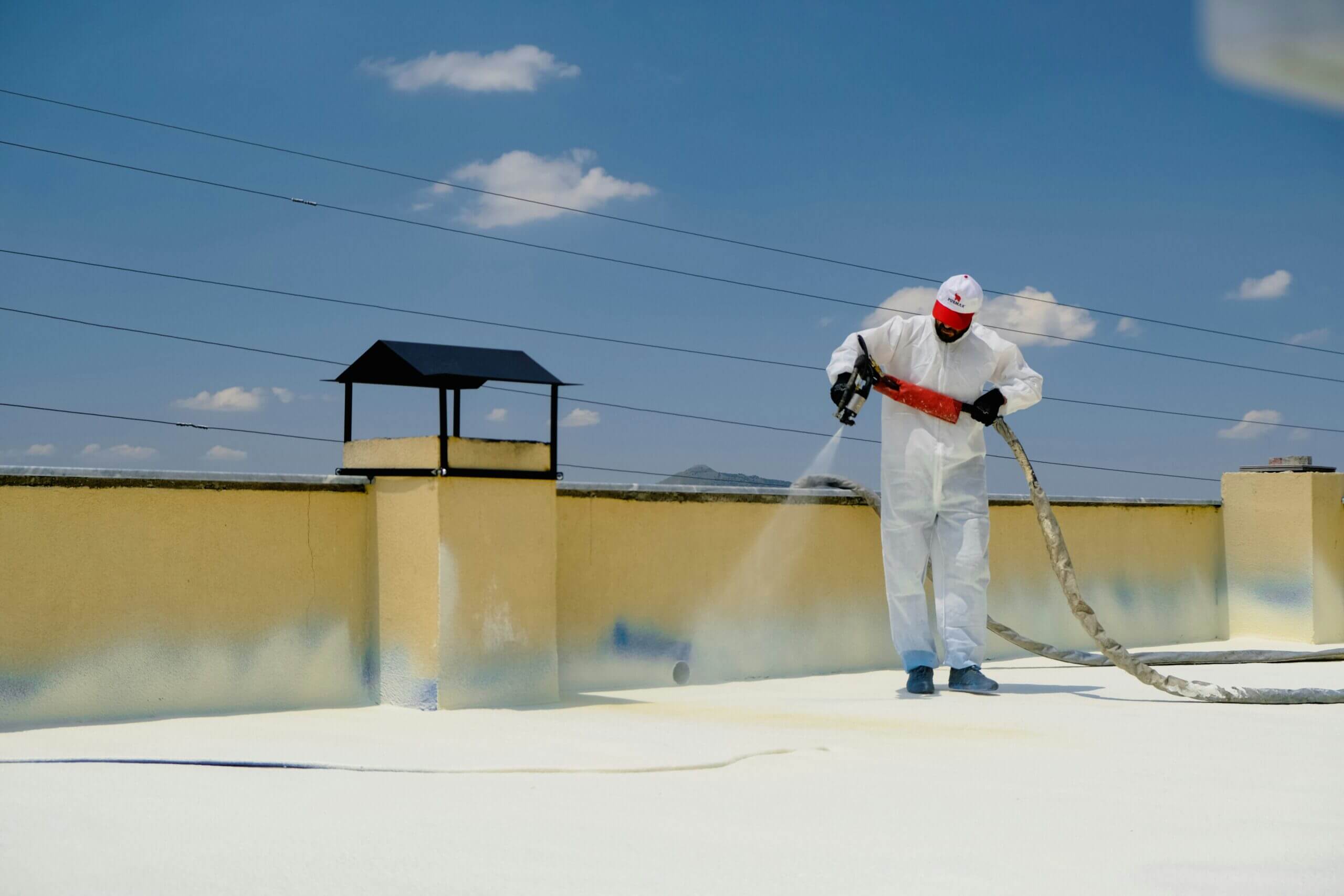
Once the foam layer is in place, they spray an elastomeric topcoat — typically silicone, acrylic, or urethane — over the surface. This coating protects the foam from sunlight, weather, and wear. They usually apply multiple coats to reach the recommended thickness and ensure long-lasting UV resistance and durability.
Roofing Granules
Contractors may embed roofing granules into the final topcoat for added protection and traction. These granules boost the roof’s durability by helping to reflect sunlight, resist impact damage, and prevent premature wear from foot traffic or wildlife. Granules also reduce surface glare, which helps for roofs exposed to direct sunlight.
Can You DIY Spray Foam Roof Installation?
SPF roofing is not DIY-friendly. It requires specialized tools and trained professionals for correct application. Improper installation can lead to adhesion problems, poor insulation, and costly repairs, so hiring an experienced contractor is essential.
Spray Foam Roof Cost Factors
Several key factors can affect the final cost of a spray foam roof:
- Labor Rates/Contractor Experience: More experienced contractors may charge higher rates, but they bring expertise that ensures proper installation, fewer issues, and longer-lasting results, saving money over time.
- Surface Quality: Roofs in poor condition may need extra prep work or repairs before foam can be applied, increasing the total cost of labor and materials.
- Roof Size: Larger roofs generally cost more in total, but they often benefit from lower costs per square foot due to efficiencies in material usage and labor.
- Type of Coating: The choice between silicone, acrylic, or urethane coatings impacts both cost and performance. Higher-end coatings may last longer and offer better UV resistance.
- Foam Thickness: Thicker applications provide better insulation and durability but require more material and time, which can increase the overall price of the project.
- Warranties: Premium warranties may require thicker foam or specific coating types, which can raise upfront costs but offer peace of mind and long-term protection.
Pros of Spray Foam Roofing
Various benefits come with spray foam roofing, including:
Superior Insulation
SPF offers one of the highest R-values per inch (about 6.5) which means it keeps your home cooler in summer and warmer in winter. This leads to lower energy bills and more comfortable living spaces.
Seamless Waterproofing
Because SPF is applied as a liquid and expands into a solid surface, it creates a completely seamless barrier. This reduces the risk of leaks, especially around pipes, flashing, and vents.
Lightweight Yet Durable
Spray foam is very light, so it won’t put stress on your home’s structure. Once cured, it’s tough enough to resist high winds, debris, and even foot traffic with the right coating.
Quick Installation
Since SPF can be applied over existing roofs, installation is faster than full tear-offs. This minimizes disruption to your daily life or business operations and often saves money on disposal fees.
Renewable System
SPF roofs can be recoated every 10 to 20 years, which extends their lifespan indefinitely. This reduces landfill waste and makes the system a sustainable long-term investment.
Cons of Spray Foam Roofing
While the pros of SPF roofing are numerous, it’s not without its share of downsides:
Weather-Dependent Installation
SPF must be applied in warm, dry weather. Conditions below 50°F or high humidity can interfere with curing and adhesion, which limits installation windows in some areas.
Professional Installation Required
Due to the complexity of SPF systems, professional installation is necessary. Improper mixing or spraying can cause major performance issues, making DIY a risky and expensive mistake.
Maintenance Needs
Though durable, SPF roofs require periodic inspections and recoating to maintain UV resistance. Ignoring maintenance can lead to foam degradation and shortened roof life.
Potential for Overspray
During installation, the foam can drift in windy conditions, sticking to unwanted surfaces like nearby cars or walls. Contractors must take precautions to avoid this problem.
Maintenance
To keep your SPF roof in top shape, schedule inspections twice a year — typically in the spring and fall. Check for cracks, punctures, ponding water, and areas where the coating may be thinning. After major weather events, such as hailstorms or high winds, it’s a good idea to do a visual check or hire a contractor for an inspection. Keep the roof clear of debris, and avoid placing sharp objects or heavy equipment directly on the foam surface. When HVAC or service technicians need roof access, lay down walk pads or request supervision to avoid accidental damage.
Repairs
SPF roofs are relatively easy to repair compared to some other systems. You can often fix minor issues like punctures, cracks, or small areas of wear using a compatible roofing-grade sealant or mastic. For larger areas of damage, a contractor will typically cut out and replace the foam, then apply a fresh coating. Since the foam must stay sealed against moisture and UV rays, a qualified professional should handle even small repairs promptly.
Recoating
Recoat your spray foam roof every 10 to 20 years, depending on the coating type, traffic levels, and weather exposure. The process includes cleaning the roof, applying a new topcoat, and possibly adding new granules. Regular recoating helps maintain UV resistance and waterproofing, extending the roof’s lifespan by decades when done consistently.
Potential Spray Foam Roof Problems
SPF systems can experience issues if not properly installed or maintained:
- UV Degradation: Without a topcoat, foam quickly breaks down under sunlight.
- Overspray Risk: Wind can carry foam to nearby areas if not controlled.
- Installation Errors: Improper mixing or surface prep can cause adhesion failure.
- Punctures: Foam can be damaged by sharp objects or heavy traffic.
- Neglected Maintenance: Skipping inspections can lead to undetected issues that grow over time.
What Materials Can Spray Foam Roofs Be Put on Top Of?
SPF roofing can be installed over various existing systems, making it ideal for retrofits:
- Built-Up Roofing (BUR)
- Modified Bitumen
- Single-Ply Rubber (EPDM, PVC, TPO)
- Metal Roofs
- Concrete
- Tar and Gravel
Proper surface preparation is key to ensuring good adhesion and long-term performance.
Frequently Asked Questions
How long will a spray polyurethane foam roof last?
With proper installation and regular maintenance, an SPF roof can last 30 to 50 years. Recoating every 10 to 20 years helps preserve its waterproof and insulating qualities.
How is a spray foam roof renewable?
SPF roofs are considered renewable because they can be recoated instead of replaced. This extends the lifespan and avoids waste from complete tear-offs.
Can you install a spray foam roof over TPO?
Yes. If the TPO membrane is aged and fully adhered, SPF can be applied directly. If not, a cover board may be needed to ensure proper adhesion.
Can spray foam be installed over a metal roof?
Absolutely. SPF sticks well to metal, seals gaps, and improves insulation. Rust should be treated beforehand to ensure proper adhesion and long-term performance.
How durable is spray foam roofing?
SPF roofs are extremely durable. They resist wind, water, and impact when properly coated and maintained. Their seamless structure adds strength and minimizes vulnerabilities.
Compare top-rated roofing pros in your area.
Read real homeowner reviews, explore qualifications, and view promotions. Modernize makes it easy to browse professionals and find one that will be perfect for your project.






